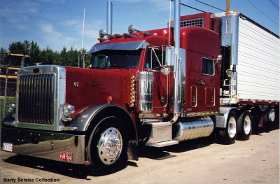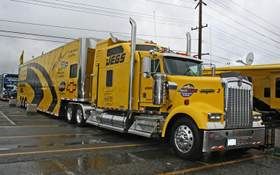Fuel Surcharge
Topic 6893 | Page 1
That's the whole premise of a company finding lease drivers and owner operators. The company will use its scale to bargain for better prices and will also provide services like parts/repair, insurance, and financing to the drivers. Naturally the company takes a cut off of everything they do.
Not to mention, the company has costs to cover in order to provide fuel at that price. Cheap fuel doesn't just get dropped off by the Cheap Fuel Fairy. Think about the administration costs alone involved in running a big trucking corporation.
I've said for a long time that there's a lot of money to be made in trucking, just not in owning the trucks and hauling freight. You want to be the one providing paid services to those who own the trucks and haul the freight. That's where the money is.
Owner Operator:
An owner-operator is a driver who either owns or leases the truck they are driving. A self-employed driver.
Dm:
Dispatcher, Fleet Manager, Driver Manager
The primary person a driver communicates with at his/her company. A dispatcher can play many roles, depending on the company's structure. Dispatchers may assign freight, file requests for home time, relay messages between the driver and management, inform customer service of any delays, change appointment times, and report information to the load planners.HOS:
Hours Of Service
HOS refers to the logbook hours of service regulations.
That's the whole premise of a company finding lease drivers and owner operators. The company will use its scale to bargain for better prices and will also provide services like parts/repair, insurance, and financing to the drivers. Naturally the company takes a cut off of everything they do.
Not to mention, the company has costs to cover in order to provide fuel at that price. Cheap fuel doesn't just get dropped off by the Cheap Fuel Fairy. Think about the administration costs alone involved in running a big trucking corporation.
I've said for a long time that there's a lot of money to be made in trucking, just not in owning the trucks and hauling freight. You want to be the one providing paid services to those who own the trucks and haul the freight. That's where the money is.
The company is helping you out for offering fuel cheaper than you can get it at the pump. The company provides you a discount. They get this discount because they buy a lot of fuel. If you want a discount as large as their's, you have to buy as much fuel as they do. They are doing you a favor. AND, they get to make some money. I fail to see where the problem is. Are you (Not you, Brett, but the OP) having a problem? You can always buy the undiscounted fuel, then you would have NO issues, right?
Owner Operator:
An owner-operator is a driver who either owns or leases the truck they are driving. A self-employed driver.
Dm:
Dispatcher, Fleet Manager, Driver Manager
The primary person a driver communicates with at his/her company. A dispatcher can play many roles, depending on the company's structure. Dispatchers may assign freight, file requests for home time, relay messages between the driver and management, inform customer service of any delays, change appointment times, and report information to the load planners.HOS:
Hours Of Service
HOS refers to the logbook hours of service regulations.
Only reason I bring it up is due to how the contract was written for Celadon O/O's. As read, the company should have passed those savings on to their contracted drivers.
HOS:
Hours Of Service
HOS refers to the logbook hours of service regulations.
Only reason I bring it up is due to how the contract was written for Celadon O/O's. As read, the company should have passed those savings on to their contracted drivers.
OK. Understood. That makes a difference. If your contract has that in there, then there has to be recourse. A couple of questions:
1.) How do you know the rate at which they pay for their bulk fuel? 2.) Do you know, with the volitility of fuel right now, what rate they got on which day?
If you are correct, that your contract states you should get it at their rate, and you know it to not be so, then you have a legitimate complaint.
HOS:
Hours Of Service
HOS refers to the logbook hours of service regulations.
Celadon Accused Of Not Passing On Fuel Savings To Drivers
Celadon is being accused of not passing on fuel savings to owner operators.
According to the Indianapolis Business Journal, Celadon, like many other carriers, has a partnership with Pilot and Flying J that provides Celadon with discounted fuel prices.
Celadon drivers are issued a fuel card. If the drivers fuel up and use their fuel card, Celadon deducts fuel costs from the driver’s pay, however, the company is being accused of not passing along the discounted price to the drivers.
A class-action lawsuit was filed against Celadon. Attorneys for the plaintiffs, Cohen & Malad, LLP, state that the lawsuit “is requesting that Celadon return the improper compensation withholdings to the drivers.”
“The class action lawsuit alleges that Celadon breached its Lease Agreement with the drivers by deducting from the drivers’ compensation more in fuel charges than Celadon paid to Pilot Flying J for those fuel charges because, unbeknownst to the drivers, Celadon had a deal with Pilot Flying J that Celadon would only pay a lower “discount price” for fuel purchased by the drivers. The lawsuit also alleges that despite only paying Pilot Flying J the lower discount price for the fuel, Celadon withheld from the drivers’ compensation the higher price ‘pump price’ of the fuel,” Cohen & Malad, LLP, the attorney’s office representing the drivers, states.
“Based on this profit-making scheme—disguised as a fuel-charge-back program—Celadon improperly diverts significant portions of those drivers’ hard-earned compensation to its own corporate coffers,” the suit states.
The Indianapolis Business Journal reports that Celadon pays a discounted rate up to $.50 per gallon.
On December 12, a Marion, Indiana judge ordered Celadon to pay $3.8 million, plus $1.7 million in interest for “over-charging drivers for fuel purchases over a 10-year period.” The money is to go to truck drivers who were affected by the discrepancy in fuel costs.
On December 19, Celadon filed a motion to have the case moved to a federal court. In addition, Celadon has filed a counter suit against the lead plaintiffs, truck drivers Charles Wilmots and Kent Vassey, claiming the drivers defaulted on their contracts.
CDL:
Commercial Driver's License (CDL)
A CDL is required to drive any of the following vehicles:
- Any combination of vehicles with a gross combined weight rating (GCWR) of 26,001 or more pounds, providing the gross vehicle weight rating (GVWR) of the vehicle being towed is in excess of 10,000 pounds.
- Any single vehicle with a GVWR of 26,001 or more pounds, or any such vehicle towing another not in excess of 10,000 pounds.
- Any vehicle, regardless of size, designed to transport 16 or more persons, including the driver.
- Any vehicle required by federal regulations to be placarded while transporting hazardous materials.
Owner Operator:
An owner-operator is a driver who either owns or leases the truck they are driving. A self-employed driver.
HOS:
Hours Of Service
HOS refers to the logbook hours of service regulations.I initially thought this thread was going to be about Carriers/Brokers passing along the FSA in their rate sheet to the O/O or lease/op. FSA being the additional CPM that carriers/brokers charge the shipper , based on the DOE's published fuel variable above base. That is, when fuel costs go above a certain price, a Fuel Surcharge Adjustment is added to the CPM rate in order to compensate for additional fuel costs over base mileage rate. Many carriers/brokers collect this from the consigner - but, in many cases - the broker/carrier pockets this and doesn't pass it along to the owner. THAT is a rip-off.
In this case - absent seeing the ENTIRE VERBIAGE of the contract, and absent actual "discount versus bulk cost" figures - "rough numbers" don't cut it and I'm just not seeing a problem here.
A major company like Celandon is not going to write a contract that leaves them open to recourse, and again - without seeing the actual verbiage, seeing the discount they negotiated, versus what they pass along to the owner, versus the overhead involved in operating the discount program - I don;t know that there's a case for legal action - or even a reason for hurt feelings.
Should the carrier be "nice guys" and pass along the entire discounted bulk rate to the owner? Yeah - OK - sure. But nice guys finish last and this is business.
As Brett illustrated - there is the administrative overhead associated with setting up and administering the program. Since the owners IS getting a DISCOUNT from the pump price (thereby lowering his operating cost) - I'm not thinking I'm going to lose sleep over the carrier pocketing some $$ in the difference between the discounted price and their negotiated bulk price.
There are a few 3rd party discount fuel programs that owners can also join. Bulk buying power for a group - nets them a discount (and lowered operating costs), and the company running the program also derives a profit over the cost it takes to operate the program. It's called BUSINESS - not a SCAM.
Just curious though - without actual numbers - you (we) have no way of determining how much Celandon is ACTUALLY making off purchases. You make it sound like they are "excessively profiting" off the backs of O/O's. Of course owners are going to consider anything more than what the discount THEY GET - to be excessive.
But again - I'm really unsure what the purpose of this discussion is IN THE FIRST PLACE. Not that I object to "intellectual debate" on industry practices or anything. Just curious what motivated you to bring this up here on TT?
Rick
Shipper:
The customer who is shipping the freight. This is where the driver will pick up a load and then deliver it to the receiver or consignee.
Dm:
Dispatcher, Fleet Manager, Driver Manager
The primary person a driver communicates with at his/her company. A dispatcher can play many roles, depending on the company's structure. Dispatchers may assign freight, file requests for home time, relay messages between the driver and management, inform customer service of any delays, change appointment times, and report information to the load planners.CPM:
Cents Per Mile
Drivers are often paid by the mile and it's given in cents per mile, or cpm.
Ya know, regardless of the outcome of this situation in particular, we do have a massive problem in this country. There's nothing wrong with a company making "honest mistakes" which of course I mean "blatant theft".
For instance, my mortgage is taken out of my account automatically. Well every month there's a 2 cent "late charge" on my bill. Now I haven't bothered calling them about it (yet) but when I do you know exactly what they'll say - "Oh sorry, that was a computer glitch" or "Sorry, we'll have that reimbursed immediately".
Just about every large corporation I've ever worked with or for has stolen money from me in one way or another, and it's always under the guise of "Sorry, that was a mistake." Of course in 43 years on Earth I can't remember a single "mistake" that put money in my pocket.
Even trucking. Every large carrier I ever worked for "forgot" to pay me for loads I hauled until I called them and "reminded" them at which point they would type away on their keyboard for a moment and always said, "Sorry. It will be in your next check." For fun I would always say, "If it's in the computer then why didn't I get paid for it already? Why do I have to call you to get my money?" They always had some prepared answer that was a pile of garbage.
Companies need to get blasted with fines when they "make mistakes" in their payroll or billing like that. You sure would see the "mistakes" dry up quickly.

Ya know, regardless of the outcome of this situation in particular, we do have a massive problem in this country. There's nothing wrong with a company making "honest mistakes" which of course I mean "blatant theft".
For instance, my mortgage is taken out of my account automatically. Well every month there's a 2 cent "late charge" on my bill. Now I haven't bothered calling them about it (yet) but when I do you know exactly what they'll say - "Oh sorry, that was a computer glitch" or "Sorry, we'll have that reimbursed immediately".
Just about every large corporation I've ever worked with or for has stolen money from me in one way or another, and it's always under the guise of "Sorry, that was a mistake." Of course in 43 years on Earth I can't remember a single "mistake" that put money in my pocket.
Even trucking. Every large carrier I ever worked for "forgot" to pay me for loads I hauled until I called them and "reminded" them at which point they would type away on their keyboard for a moment and always said, "Sorry. It will be in your next check." For fun I would always say, "If it's in the computer then why didn't I get paid for it already? Why do I have to call you to get my money?" They always had some prepared answer that was a pile of garbage.
Companies need to get blasted with fines when they "make mistakes" in their payroll or billing like that. You sure would see the "mistakes" dry up quickly.
Brett,
This goes exactly with something I have said for a long time. It is a bit political, but here goes.
This is about hiring illegals. The reason that undocumented workers get used is because they are cheap. To solve the problem, make it a mandatory fine of $50,000 per instance. Hire 10 illegals? $500,000 fine. The government needs to hire people to investigate these things. THEN, when the undocumented cannot get jobs, they will stop coming over illegally. Easy fix, businesses stop doing it, lowers legal unemployment rate because these businesses must pay employees more. It is a win/win/win.
New Reply:
New! Check out our help videos for a better understanding of our forum features

















Preview:
This topic has the following tags:
Owner Operator Truck Driver Salary







 TT On Facebook
TT On Facebook
I asked this on another forum, but haven't received an answer yet, so I'll just copy/paste it over here to get y'all's input.
Jerry Ott, since you drive for Celadon I figured I'd ask your opinion on this story I read recently. It was about fuel prices, and the difference between what the company pays, and then what they charge you, the Owner/Op. Have you found a big difference in the two numbers?
In case no one else has seen the story here is the basic gist. I'll use rough numbers just to keep the math simple, but the principle is the same as what is actually happening.
Say fuel at the pump is $4.00 per gallon. The card Celadon gives its O/O brings the price down to say $3.90 per gallon. However, due to the company's ability to purchase fuel at bull rates they only pay say, $3.50 per gallon.
This means that they are making money each time you fill up.
For that example let's say you run 3000 miles in a week and average 6.5 mpg (easily within normal operating parameters). Each week Celadon would be making $185.00 (rounded up) off of your fuel purchases.
Now I understand they are a company I'm business to make money. But that seems a bit excessive.